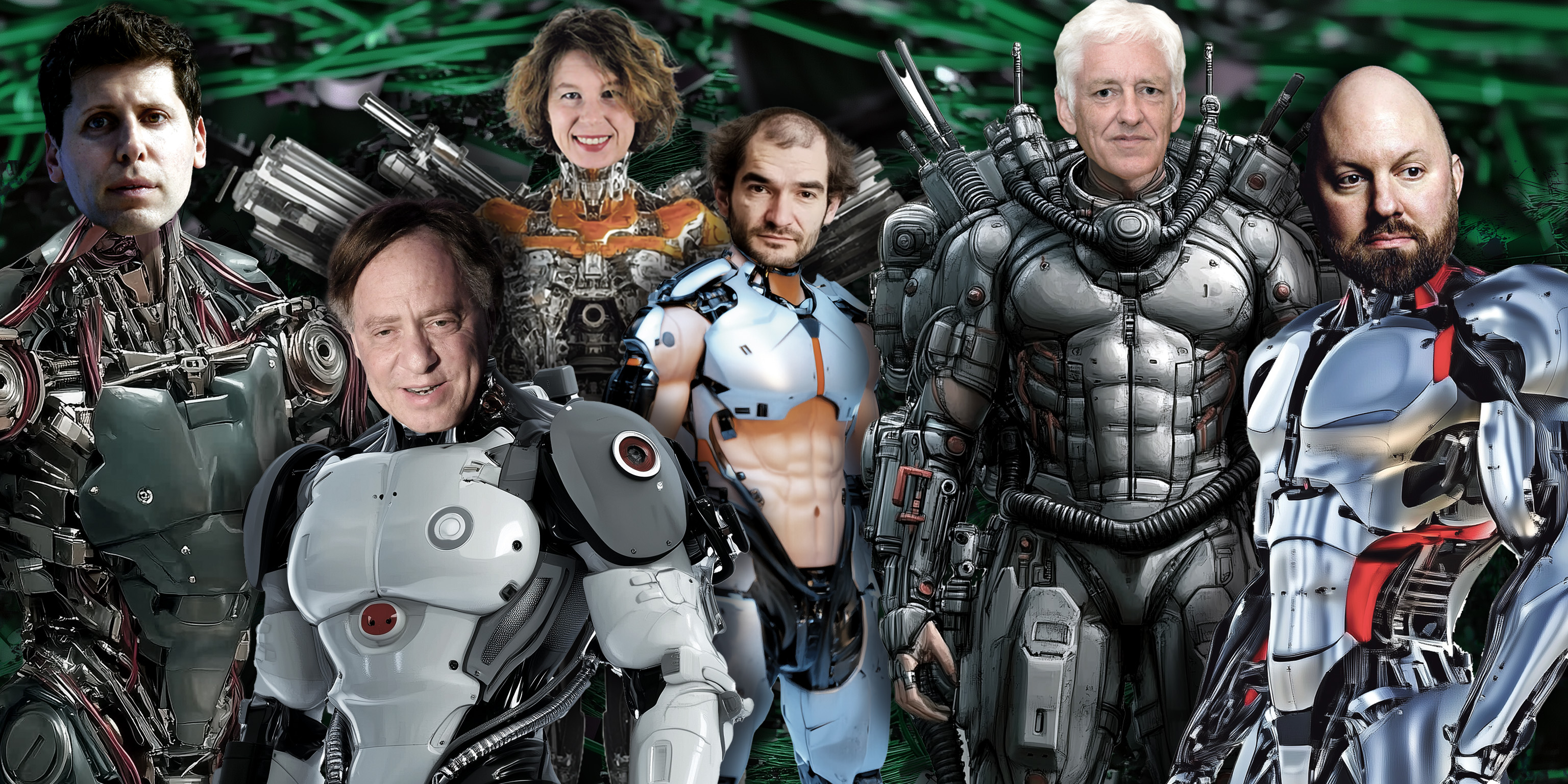December began with a little-remarked anniversary. It’s been a whole two years since the startling public debut of ChatGPT launched a billion flawless high school essays and spooked the public with fears of how the ghost in the machine might soon come to haunt every part of our lives.
ChatGPT has become the eighth-most-visited website, surpassing even TikTok and Pornhub. Its parent company, OpenAI, did a lavish deal with Microsoft, putting elements of its technology into most modern computers. The gold rush was on, and Google Gemini, Claude, Llama, Ernie, Grok and Apple soon followed with similar large language models (LLMs).
And yet, for all the drama surrounding the launch of LLMs, subsequent improvements have been less spectacular, and some experts are wondering whether the technology has hit a wall.
But then, on 6 December, a report in London’s Financial Times gave new life to concerns about whether artificial intelligence (AI) can be kept under control in the face of commercial imperatives.
OpenAI, the newspaper reported, was considering dropping a safety clause from its contract with Microsoft to attract more investment from the software giant, which has already given it $13-billion.
The clause deals with artificial general intelligence (AGI), a mooted breakthrough that would be, in OpenAI’s definition, “a highly autonomous system that outperforms humans at most economically valuable work”.
The contract in its present form would deny Microsoft a future AGI version of the technology. AGI would be owned exclusively by OpenAI’s nonprofit wing, which would be able to make a decision about its use with non-commercial considerations uppermost in mind.
OpenAI has attracted controversy – and a continuing lawsuit from cofounder Elon Musk – for allegedly turning away from the nonprofit, public-good ethos on which it was founded. Its chief executive, Sam Altman, was briefly ousted by the board in late 2023 over concerns about transparency and AI safety, but he was reinstated after internal turmoil and intervention by stakeholders, most notably Microsoft.
Will it or won’t it?
For decades, AI theorists have predicted a moment when AI outstrips human intelligence, causing runaway development and an explosion of superintelligence that leaves human beings trailing far behind.
The futurist Ray Kurzweil popularised the idea in his 2005 book, The Singularity Is Near. Computers would reach human-level intelligence in 2029, he said, and become superhuman around 2045.
This moment, when all bets are off, is called the “technological singularity”, borrowing a term from physics.
Kurzweil’s vision of the singularity has remained influential, framing debates about how and when AI might surpass humans. In an interview with The Guardian in June, Kurzweil, who now works for Google, stuck by his predictions.
“AGI means AI that can do everything that any human can do, but to a superior level… And my five-year-out estimate is actually conservative: Elon Musk recently said it is going to happen in two years.”
Altman, the OpenAI chief executive, has taken to defining AGI narrowly, drawing a sharp distinction between it and runaway superintelligence.
On 4 December, at a New York Times conference, he said: “My guess is we will hit AGI sooner than most people in the world think and it will matter much less.”
That seemed to contradict an essay he wrote a year earlier, in which he said: “This may turn out to be the most consequential fact about all of history so far. It is possible that we’ll have superintelligence in a few thousand days (!); it may take longer, but I’m confident that we’ll get there. How did we get to the doorstep of the next leap in prosperity? … Deep learning worked, got predictably better with scale, and we dedicated increasing resources to it.”
And a few weeks ago, he declared in an interview: “Eventually, we’ll solve every problem in physics.”
AI’s Achilles’ heel?
However, according to a leak from OpenAI insiders, the rate of improvement of the LLM technology appears to be slowing down.
Technology news website TechCrunch reported in November: “Employees who tested the new model, code-named Orion, reportedly found that even though its performance exceeds OpenAI’s existing models, there was less improvement than they’d seen in the jump from GPT-3 to GPT-4.
“In response, OpenAI has created a foundations team to figure out how the company can continue to improve its models in the face of a dwindling supply of new training data.”
Indeed, this may be the Achilles’ heel of the current approach to AI. LLMs have already been trained on virtually every record that humanity has ever produced, but such data may inherently be inadequate for AI to figure out the true nature of the underlying reality it describes.
As the physicist and science populariser Sabine Hossenfelder pointed out on YouTube in November: “Deduction only gets you so far. Then you’ll need better data.”
Some AI companies are talking about solving the data problem by using AI-generated data to train AI, which is enough to make your head explode.
AI’s insatiable data hunger made headlines in December when news emerged that Suchir Balaji, a former OpenAI employee who worked on ChatGPT, had been found dead in his San Francisco flat. In an October interview with The New York Times, Balaji alleged that AI training violated copyright laws by using copyrighted material without permission. His death was later ruled a suicide.
On the data problem, ChatGPT itself observes: “AI-generated data is a shortcut, not a substitute, for the diversity, complexity and richness of real-world data.” It goes on to warn of “pitfalls like bias amplification, loss of realism and ethical quandaries”.
Ilya Sutskever, the cofounder and former chief scientist of OpenAI, who left in May to found a safety lab called Safe Superintelligence, told Reuters in November that results from scaling up AI training have plateaued.
At the same time, Bloomberg reported that a forthcoming version of Google’s Gemini “is not living up to internal expectations”.
But, for his part, OpenAI’s Altman posted on X on 14 November: “There is no wall.”
Of course, he does have a $157-billion company valuation to protect, and his former partner Sutskever takes a different view.
“The 2010s were the age of scaling. Now we’re back in the age of wonder and discovery once again. Everyone is looking for the next thing,” Sutskever said.
Regardless of diminishing returns, AI companies are continuing to throw brute computing power at the problem, consuming ever-increasing amounts of energy. AI relies on vast arrays of specialised chips that guzzle electricity. Goldman Sachs predicts that its energy demand will grow 160% by 2030, by which time data centres will account for 8% of power consumption in the US.
AI’s energy demands are so immense that a unit of Three Mile Island, the Pennsylvania nuclear power plant notorious for a core meltdown in 1979, has been recommissioned under a contract to supply power to Microsoft’s data centres.
The agreement, concluded in September, gives the reactor a new name: Crane Clean Energy Center. Times change.
Developments and dangers
Irrespective of the big picture, the application of AI marches on. Among developments promised for 2025, Microsoft has announced that its Teams videoconferencing platform will auto-translate, letting participants speak in the language of their choice.
Several AI companies are promising automated agents that work their way autonomously into business processes, understanding them and taking care of routine needs in the background.
“2023 was the year of being able to chat with an AI,” wrote computer scientist Peter Norvig, a fellow at Stanford’s Human-Centered AI Institute, in a recent blog post. “[Soon] we’ll see the ability for agents to get stuff done for you. Make reservations, plan a trip, connect to other services.”
This poses the danger of AI gaining access to, and possibly disclosing, confidential information, or inventing false information (a persistent AI problem known as “hallucinating”) in the brain of your company’s accounting system. For these and other reasons, laws governing AI are in the works around the world. The US alone has more than 120 bills at various stages. The EU became the first to pass a comprehensive law, which came into force in July.
Of course, tight regulations in some countries could give others an advantage – just as China now controls 90% of the world drone market because, said Netscape cofounder Marc Andreessen in an interview recently, regulation has choked off drone development in the West.
It’s a tough balance of interests, but the Council of Europe has taken a first step towards resolving it by negotiating and promoting an international treaty to ensure that “AI systems are aligned with human rights, democracy and the rule of law”.
Opened for signing on 5 September, the treaty has 37 signatories so far, including the US, Britain and the EU – as well as countries less known for their technology such as Moldova, San Marino and Malta. China and Russia are conspicuous by their absence.
Local situation
In South Africa, only the 2013 Protection of Personal Information Act governs uses of AI. In August, however, the Department of Communications and Digital Technologies published a draft policy framework that could lead to a local set of AI-specific regulations. Public comments closed at the end of November.
“For South Africa to exploit the full potential of AI, the country needs to carefully take into consideration ethical, social and economic implications, ensuring that AI benefits are broadly shared and risks are managed effectively,” the draft policy reads.
“A cornerstone of this framework is the commitment to ethical AI development and use. It integrates comprehensive guidelines to ensure AI systems are transparent, accountable and designed to promote fairness while mitigating biases.
“This includes establishing robust data governance frameworks to protect privacy and enhance data security, alongside setting standards for AI transparency and explainability to foster trust among users and stakeholders.
“Without a coherent and comprehensive policy position, these benefits could be overshadowed by potential risks such as job displacement, privacy concerns and ethical dilemmas.”
The draft policy further says the department envisions the use of AI “to transform South Africa’s economy, reduce unemployment, and foster innovation”.
But in a section titled “the weight of the past”, it warns that “the persistent digital divide, characterised by unequal access to technology and education, poses a significant challenge. Bridging this divide is crucial for ensuring equitable AI adoption and benefits.”
As countries around the world grapple with AI’s rapid development, issues such as fair access, ethical implementation and risk reduction remain shared challenges.
- In case you’re wondering about the accuracy of this article, the modern oracle has spoken. “Your draft is well supported by sources and effectively highlights the nuances of AI’s rapid development,” says ChatGPT. The writer is relieved. DM
This story first appeared in our weekly Daily Maverick 168 newspaper, which is available countrywide for R35.





